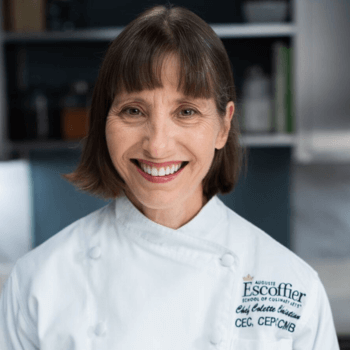Listen to This Article:
The baker’s life is one of precision and attention to detail. It’s a daily dance of creating perfectly baked bread with a mouth-watering crunch, delicate, evenly-sized macarons, and show-stopping, flavor-filled cakes.
If you love to focus on tiny details—weighing the dough for each individual cookie, making temperature adjustments based on your altitude, and knowing by feel whether a dough is too dry or too sticky—then you may have the makings of a baker.
Are you thinking about making the leap?
Whether you’re an amateur baker who wants to go pro, or a total novice who’s just testing the waters, here’s what it could take to become a professional baker.
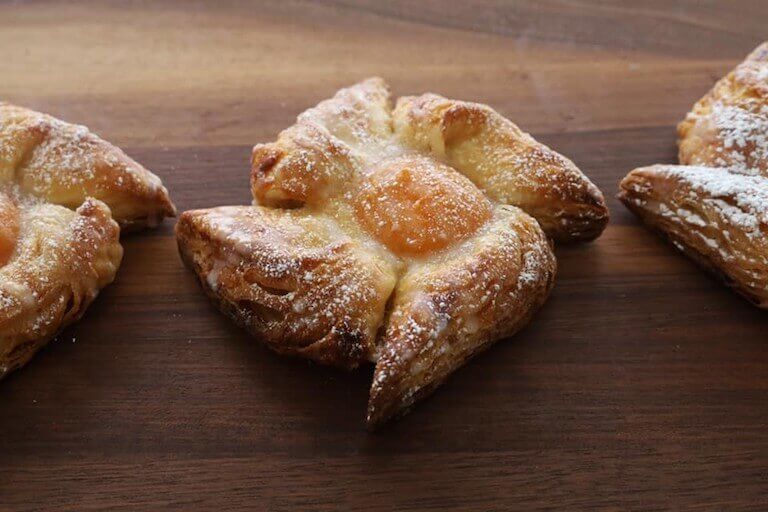
A viennoiserie created by Escoffier student Danny N.
Three Steps to Becoming a Professional Baker
If you surveyed a group of bakers, you’d likely find they had followed a variety of pathways to attain their professional success. So there are many possible ways to become a professional baker. But if you’ve got your heart set on an oven-centered career, here’s a step-by-step process that could get you there.
1. Get Your High School Diploma or Equivalent
There are no formal education requirements for becoming a baker. But if you plan to go to baking or culinary school, you’ll likely need to be at least 16 years old and have your high school diploma or equivalent first (this is the case at Escoffier, for example).
Even if you don’t choose to attend baking school, many employers across all industries often like to see applicants who have at least finished high school or received an equivalent credential like their GED. It can show that you can follow through with assigned work and display a minimum level of responsibility.
2. Learn the Baking ABCs at Baking & Pastry School
Though you may have experience as a home baker, there is so much to learn beyond the home kitchen skill you’ve acquired so far. All bakers have to start at the beginning.
Baking is a scientific art, combining chemistry with design to create something both delicious and beautiful. Baking school teaches students not only how to bake things like a loaf of bread, but why flour, salt, water, and yeast turn into bread when heat is applied.
In baking and pastry school, you may be introduced to these types of baking fundamentals, which you can then build on for the rest of your career. This education can prepare students for their first jobs in the industry.
The Difference Between a Baker and a Pastry Chef
Baking and pastry are often taught together, but the job of a pastry chef is not necessarily the same as that of a baker.
Pastry chefs are usually responsible for desserts of all types, like custards, ice cream, French pastries, chocolates, and more. They could work in a bakery or in the pastry department in a restaurant.
Bakers specializes in baked goods like bread, pies, rolls, cakes, pastries, donuts, and buns. They generally don’t venture out into plated desserts. Bakers may work in bakeries or restaurants, especially if they serve breakfast or homemade bread.
While attending baking and pastry school is not the only way to learn professional baking skills, that degree or diploma may make it easier for you to find your first job.
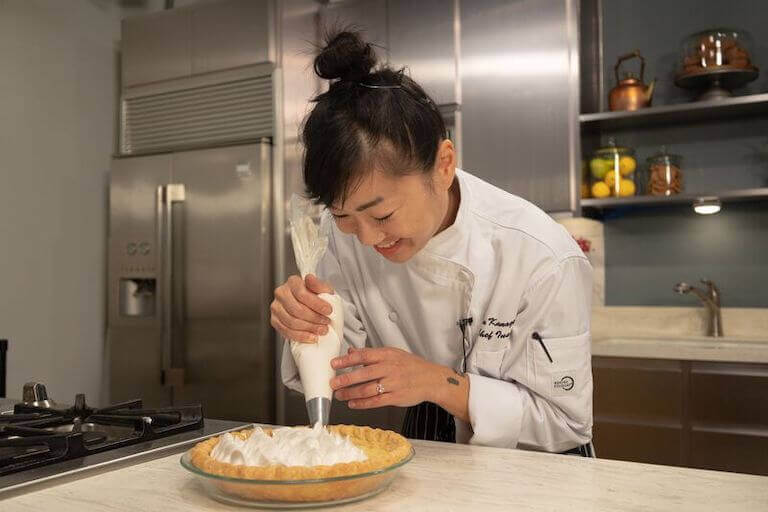
In Pastry and Baking school, students learn everything from baking basics to complex finish techniques like piping.
3. Get Your First Baking Job or Apprenticeship
After completing your baking program, it’s time to enter in the kitchen as a baking professional. Bakeries don’t always have consistent job titles, but many entry-level and apprentice positions fall under the umbrella of baker’s assistant or associate. These jobs usually include anything necessary to make the head baker’s job easier, like stocking ingredients, cleaning, kneading dough, preparing fillings, and possibly helping customers. They may also do some of the more basic baking.
Your first job in a bakery is where you’ll get to try out the schedule and lifestyle of a professional baker. Baking shifts often start in the early morning—think 3 am—so that the baked goods, whether that’s bread or pastries, are ready for customers during regular business hours.
Sometimes, your baking and pastry school can help you get your first job placement. For example, at Auguste Escoffier School of Culinary Arts, students must complete one or two industry externships before they receive their degrees or diplomas. This externship is not only part of their education experience; it sometimes turns into full-time employment. In addition, high quality culinary schools might offer career services and networking opportunities to get you connected with the right people.
The Job Outlook for Bakers Is Healthy
The market for bakers is expected to grow 5% between 2023 and 2033 according to the US Bureau of Labor Statistics, which is about on par with the national average for growth.
But there will be the need for many more bakers than that. Some existing bakers will leave the industry during those years, either due to retirement or changing careers. BLS estimates that there will be over 40,400 baker positions to be filled each year between now and 2033, to cover for people who retire or move to other industries between new roles and replacing those who separate from the industry.
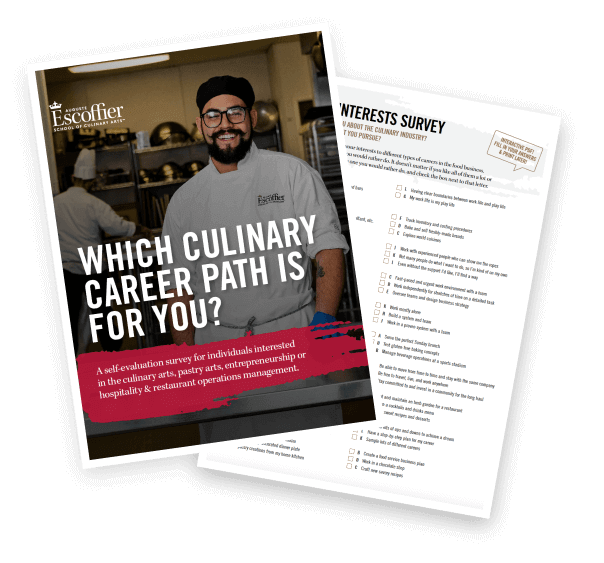
Take the Culinary Career Survey
We’ve compiled a checklist of all of the essential questions into one handy tool: career options, culinary interest surveys, educational opportunities, and more.
Once You’re a Working Baker, Consider Bakery Certifications
Once you’re a working baker, it can help build your credibility and authority to work towards additional baking certifications. While they’re not a requirement for becoming a successful baker, some of the best bakers in the industry choose to pursue these extra credentials as they progress through their careers.
The respected industry group Retail Bakers of America (RBA) offers prestigious certifications to bakers who have enough experience and can prove their baking skills through rigorous practical exams. Having these titles may increase your earning potential, as they prove that you have a certain level of precision and skill as a baker.
The Retail Bakers of America offers the following certifications:
Certified Journey Baker or Certified Journey Decorator
These introductory certifications are for those early in their careers who assist in the production of baked goods for commercial bakeries. They must have at least 2,000 hours of experience or a combination of experience and education.
Certified Baker or Certified Decorator
The next level is Certified Baker or Certified Decorator. These more advanced certifications are for those who are further into their careers and have a higher degree of responsibility in the bakery. They must have at least 4 years of experience or a Journey certification plus 3 years of experience.
Certified Master Baker
This is the highest level of bakery certification from the RBA, and it’s for expert bakers who also manage the output of others. This certification has extensive education requirements, plus 10 years of experience or a Certified Baker designation and 3 years of additional experience.
All of these certifications also have associated tests. Escoffier Chef Instructor and Certified Master Baker Colette Christian recalls her two-day exam. “It’s 16 hours of baking,” she said, “with the judge literally standing right over you. It’s not like you present them with four Danishes. You present 32 Danish pastries, and they weigh every single one of them. And you can’t be off, everything has to be perfect.”
Continuing Professionalism: Practice and Improve Your Baking Over Time
Your journey doesn’t end once you’ve become a working baker! There’s a whole world of baking styles out there, and there’s always more to learn.
Bakers spend years honing their skills, reaching higher levels of consistency and excellence over time. It’s not enough to make one perfect batch of macarons. You must be able to make batch after batch after batch, all uniform in flavor, shape, and size.
Baking is an exercise in consistency, and it takes time to get it right. Working in a commercial bakery or your own baking business gives you an ongoing opportunity to practice, practice, practice.
Most bakers start as apprentices and work their way up through roles with more responsibility and supervisory duties. As you gain skill and knowledge, you can become someone with enough know-how to make strategy or design decisions. Bakers who have this kind of experience may eventually seek a head pastry chef or baker position or even start their own businesses. They might open a bread and pastry bakery, a custom cake business, or a dessert catering venture. The only limit to the possibilities is your own creativity and drive.
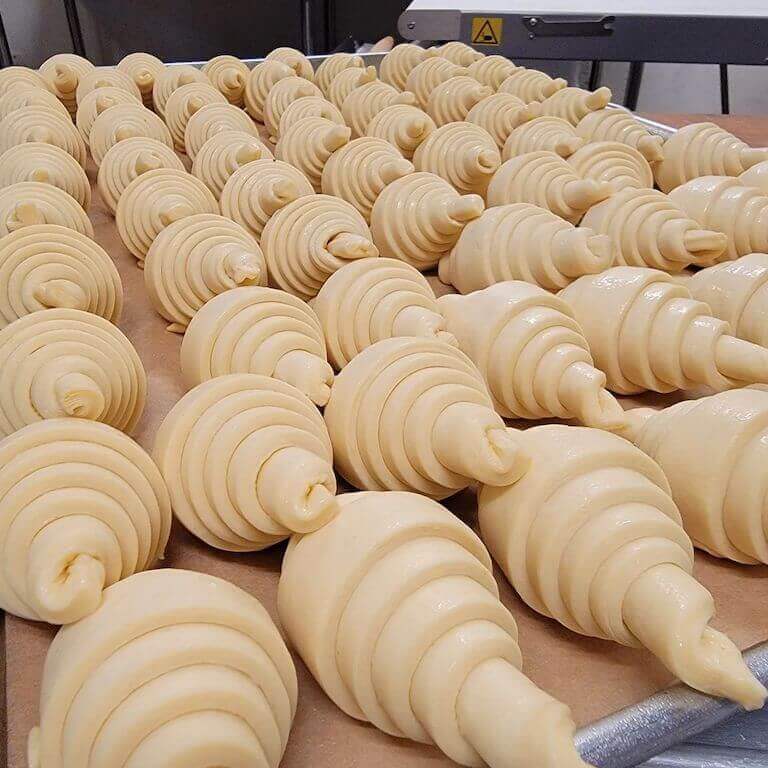
Professional bakers need to know not only how to bake, but how to bake consistently even in large batches.
What Can You Learn in Baking & Pastry School?
Though you could get on-the-job training as a baker, baking and pastry school is one of the most direct routes to gainful employment as a professional baker. Many options exist, including both in-person and online programs. So, what exactly do you learn in these vocational baking programs? Various programs include different specific courses, but here are some of the skills you may learn in baking school.
Baking Basics
Culinary programs typically start with basic skills, such as safety and sanitation, knife skills, the concept of mise en place (measuring and preparing all your ingredients before beginning to cook), and keeping your workstation clean and organized.
Of course, you can also learn specific baking skills. Baking programs may teach multiple methods for making and mixing doughs, custards, dessert sauces, and pâte à choux. Plus, they’ll usually dive into the foundations of bread, exploring the right temperature for starters, pre-ferments, and various doughs for a variety of breads and rolls.
And though the hands-on baking is certainly the most fun and delicious, baking math is another essential skill for bakers, so you can accurately convert recipes to smaller or larger yields as needed and keep your kitchen profitable.
Additional Baking, Pastry, and Dessert Skills
Building on the basics, students in a professional baking program may then move on to additional pastry and dessert skills. For example, they can practice cake design and decorating, working on fine piping and icing decorations, or how to use fondant. They may be introduced to new trends in desserts and plating to keep their dishes looking modern and fresh.
They could branch out into confiserie—the art of making candy—as well. These additional dessert staples like chocolate, sugar confections, fruit desserts, and frozen desserts are challenging to make, so professional training can be a real asset in your future career.
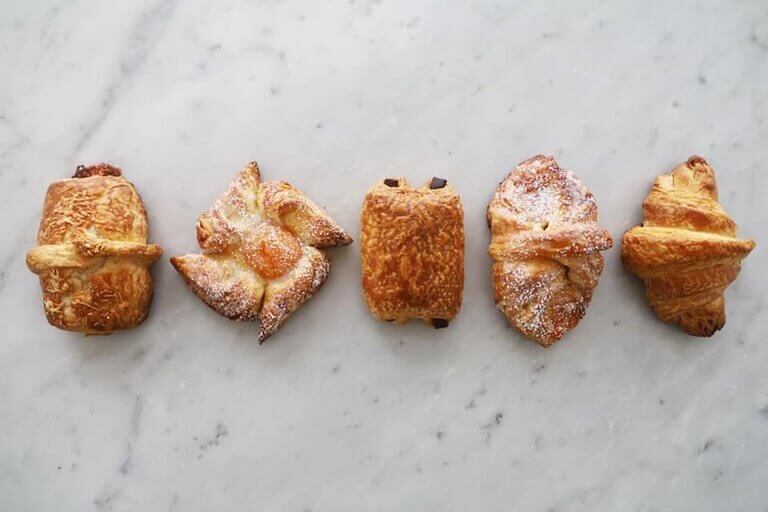
Baking and pastry arts school trains you in many special techniques, from sauces, pastries, bread baking, cake making, and more.
Foodservice & Business
Beyond the baking, there’s more to cover to help you become a well-rounded baker. Bakeries are businesses. Like any food service business, they need sound financial planning and operation to be competitive in the marketplace.
A good quality baking and pastry arts program can provide you with education on topics such as menu planning, cost control, and inventory management to help you make plans to properly price your baked goods and stay profitable.
Coursework in business planning, management, and business ethics can also help students to become leaders in their future bakeries.
What Qualifications Do You Need to Become a Baker?
Like all of the culinary arts, there are no industry-wide requirements to become a baker. Some bakeries may require their incoming employees to have a baking and pastry education. Others will only hire those with a certain amount of experience.
In any new position, there is an element of training, so you can learn the recipes and procedures unique to that employer. But bringing a solid foundation of key skills, like food safety, baking fundamentals, and some specialty skills, like piping, with you to the job can make you a more attractive candidate.
A baking & pastry degree or diploma from a school like Escoffier has the potential to really make you stand out as a job applicant.
How Long Does It Take to Become a Baker?
Everyone’s path to the role of baker will look a little different. You can get a degree or diploma in baking and pastry arts in as little as 60 weeks. If you’re trying to gain professional experience on the job, some find that it can take several years to get out of the “apprentice” or assistant stage and into the position of a baker.
By attending a baking and pastry program, it’s possible to reduce the amount of time necessary to take that next step.*
*Information may not reflect every student’s experience. Results and outcomes may be based on several factors, such as geographical region or previous experience.
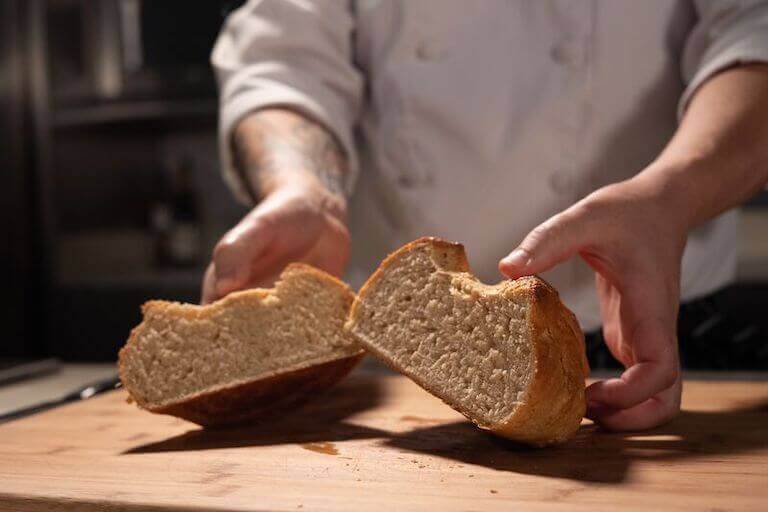
Professional bakers need to practice to perfect even their basic skills, like baking a beautiful loaf of bread.
Are You Ready to Rise to the Challenge?
Every master baker, from French pastry chef Dominique Ansel to cake master Claire Ptak, had to start somewhere on their baking journey. Do you think you have what it takes to become a detail-oriented bread, pastry, or confection artist? Escoffier is here to help you pursue your baking dreams! Whether you’re looking for an in-person or online Baking and Pastry Arts program, we have you covered.
Reach out to our Admissions Department to learn more about how to make baking and pastry school a real possibility for you.
TO LEARN MORE ABOUT THE BAKING AND PASTRY ARTS, TRY THESE ARTICLES NEXT:
- How to Start Your Own Bakery
- A Guide to Sourdough Bread: Recipes, Traditions, and Bakery Tips
- Do You Need Pastry School to Be a Pastry Chef?
This article was originally published April 27, 2022 and has been updated.

